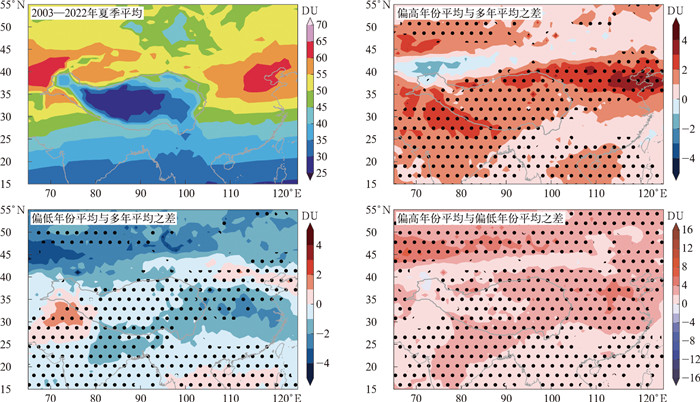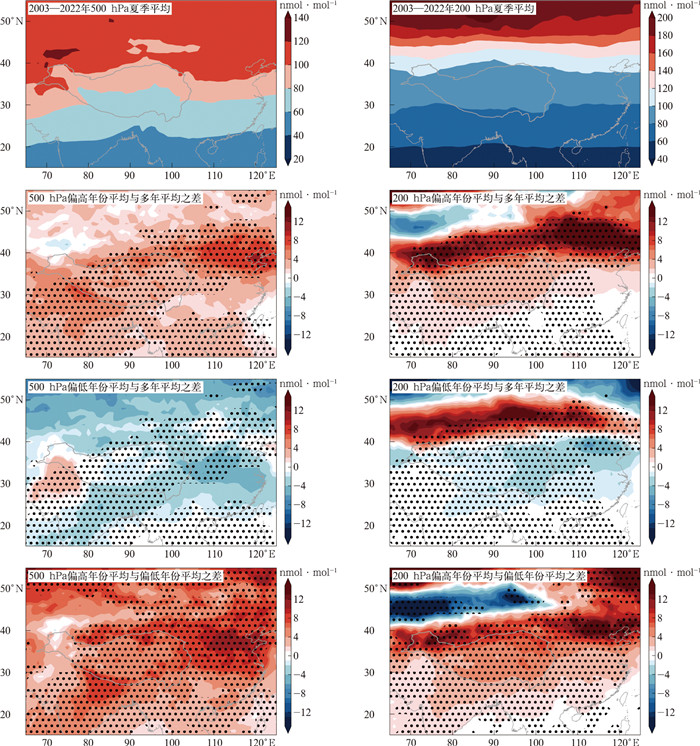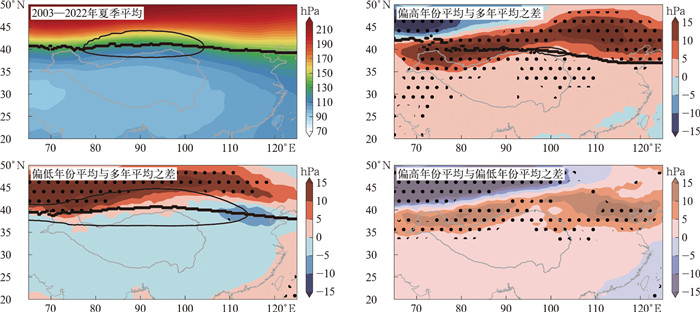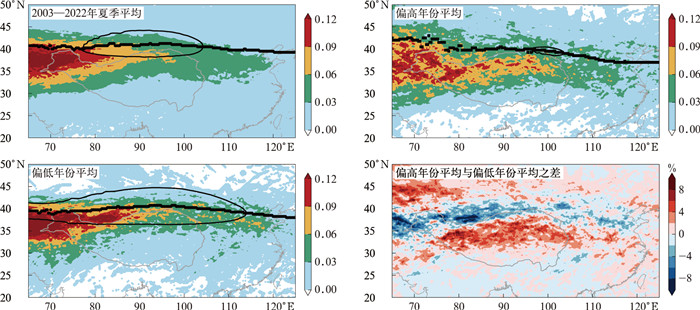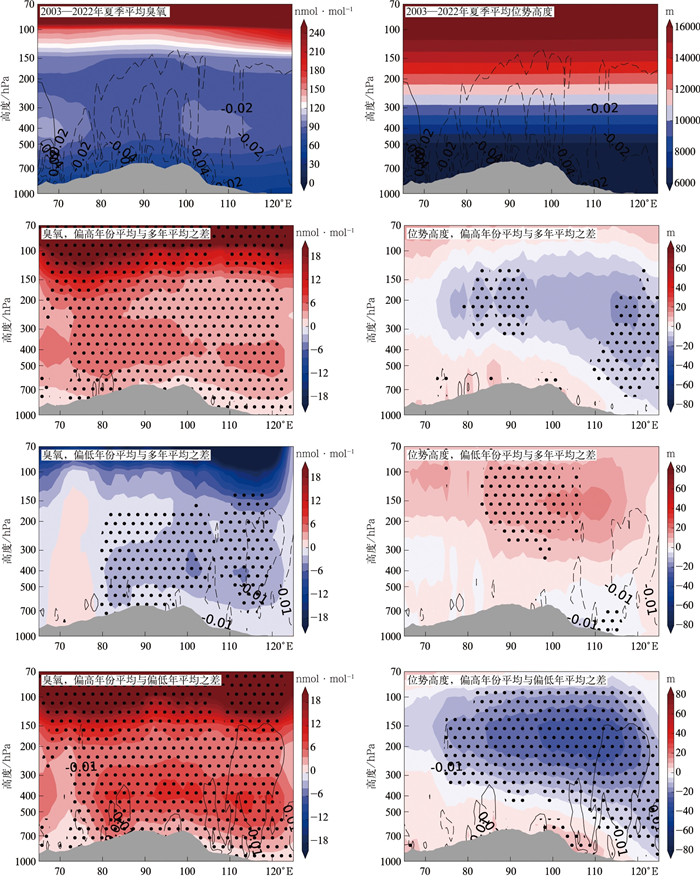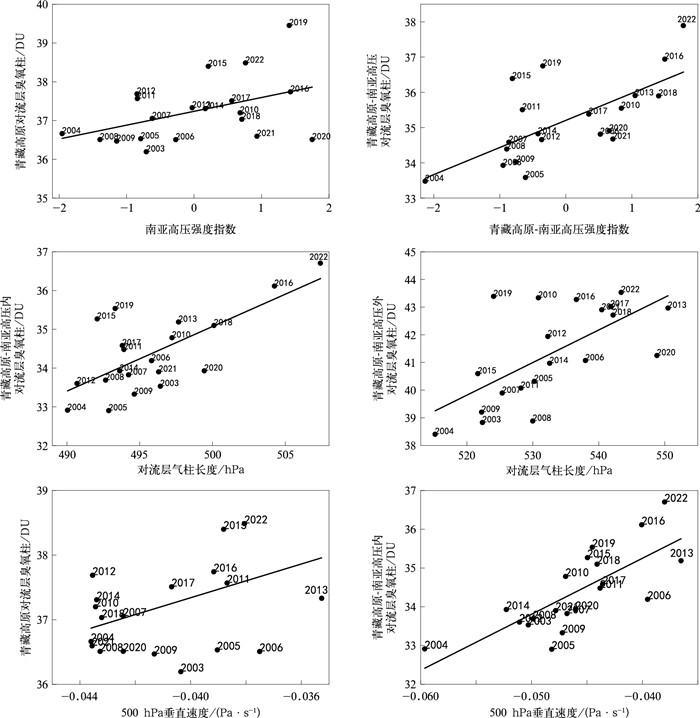Interannual Variation of Tropospheric Ozone over the Tibetan Plateau in Summer and Its Influencing Factors
-
摘要: 基于2003—2022年ERA5(ECMWF reanalysis v5)再分析数据、AIRS(atmospheric infrared sounder)卫星数据和中国生态环保部的地面臭氧等数据, 采用合成分析和相关分析方法发现夏季青藏高原地区对流层臭氧柱总量年际变化特征明显, 并以每年约0.08 DU的速度增加。青藏高原地区对流层臭氧柱总量高低年份差异不仅与对流层高低层臭氧垂直分布直接相关, 更与高低层动力和化学过程有关。分析发现:当青藏高原地区对流层臭氧柱总量偏高时, 青藏高原北侧对流层顶偏低, 副热带西风急流偏弱且存在断裂, 较弱的传输屏障使平流层对流层交换增强, 有利于平流层高浓度臭氧空气下传。对流层低层的垂直环流通过向上传输低浓度臭氧空气影响整个对流层臭氧浓度。此外, 青藏高原西南部对流层整层的臭氧浓度偏低还与南亚高压异常有关, 青藏高原腹地对流层臭氧柱总量偏高可能与地面污染物排放、地面太阳净辐射量异常偏高有关。Abstract: The Tibetan Plateau, located in the mid-latitude region of the Asian continent, is commonly referred to as the third pole and the water tower of Asia. The high-altitude terrain and distinct circulation systems contribute to the formation of an ozone valley in the atmosphere above the Plateau. The discovery of this ozone valley has garnered significant attention from the international scientific community regarding the ozone levels over the Tibetan Plateau. At the same time, in the context of global warming, the increase of surface ozone concentrations in various regions of the world has posed significant threats to both human health and ecological environment. However, due to limited observational data and satellite data of short time scales, past studies on the Tibetan Plateau's ozone primarily focused on total column ozone, the upper troposphere and lower stratosphere, or surface ozone, while fewer studies have examined the tropospheric ozone column over the region. Therefore, longer-term data are needed to investigate the interannual variability and influencing factors of the tropospheric ozone column over the Tibetan Plateau. Based on AIRS (atmospheric infrared sounder) satellite data from 2003 to 2022, the tropospheric ozone column over the Tibetan Plateau during summer seasons from 2003 to 2022, as well as its interannual variation characteristics are analyzed. Additionally, using ERA5 reanalysis data from 2003 to 2022 and surface station data from China's Ministry of Ecology and Environment from 2015 to 2022, the study employs composite and correlation analyses to explore the factors influencing the tropospheric ozone column over the region. Results show that the tropospheric ozone column over the Tibetan Plateau during the summer exhibits significant interannual variability, increasing at a rate of approximately 0.08 DU per year. The difference of total tropospheric ozone column in high and low years is not only directly related to the difference of vertical distribution of ozone in the upper and lower troposphere, but also related to the difference of dynamic and chemical processes in the upper and lower troposphere. When the total tropospheric ozone column over the Tibetan Plateau is elevated, the tropopause on the northern side of the Plateau is lower, and the subtropical westerly jet is weak and fragmented. The weak transmission barrier enhances stratospheric tropospheric exchange, which is beneficial to the downward transmission of stratospheric high-concentration ozone air, while the vertical circulation in the lower troposphere affects the ozone concentration in the whole troposphere by upward transmission of low-concentration ozone air in the lower troposphere. The tropospheric ozone column anomaly in the northern Plateau is primarily associated with tropopause folding, while the lower ozone concentration across the entire troposphere in the southwestern Plateau is linked to anomalies in the South Asian High. The elevated tropospheric ozone column over the central Plateau may be associated with unusually high levels of surface solar radiation and emissions from surface pollutants.
-
Key words:
- tropospheric ozone;
- the Tibetan Plateau;
- summer;
- impact factor
-
图 2 夏季高原及其周边地区对流层臭氧柱总量(填色)
(打点区域表示对流层臭氧柱总量差达到0.01显著性水平,灰色细线为高原边界和海岸线,下同)
Fig. 2 Summer total amount of tropospheric ozone column (the shaded) over the Plateau and its surrounding areas
(the dotted denotes difference in total amount of tropospheric ozone column passing the test of 0.01 level, and the gray thin line denotes the Plateau boundary and coastline, similarly hereinafter)
-
[1] 陈闯, 田文寿, 田红瑛, 等.青藏高原东北侧臭氧垂直分布与平流层-对流层物质交换.高原气象, 2012, 31(2):295-303.Chen C, Tian W S, Tian H Y, et al. Vertical distribution of ozone and stratosphere-troposphere exchanges on the northeastern side of Tibetan Plateau. Plateau Meteor, 2012, 31(2): 295-303. [2] Zhu B, Hou X W, Kang H Q. Analysis of the seasonal ozone budget and the impact of the summer monsoon on the northeastern Qinghai-Tibetan Plateau. J Geophys Res Atmos, 2016, 121(4): 2029-2042. doi: 10.1002/2015JD023857 [3] Monks P S, Archibald A T, Colette A, et al. Tropospheric ozone and its precursors from the urban to the global scale from air quality to short-lived climate forcer. Atmos Chem Phys, 2015, 15(15): 8889-8973. doi: 10.5194/acp-15-8889-2015 [4] 徐晓斌. 我国霾和光化学污染观测研究进展. 应用气象学报, 2016, 27(5): 604-619. doi: 10.11898/1001-7313.20160509Xu X B. Observational study advances of haze and photochemical pollution in China. J Appl Meteor Sci, 2016, 27(5): 604-619. doi: 10.11898/1001-7313.20160509 [5] 王占山, 李云婷, 陈添, 等. 北京城区臭氧日变化特征及与前体物的相关性分析. 中国环境科学, 2014, 34(12): 3001-3008.Wang Z S, Li Y T, Chen T, et al. Analysis on diurnal variation characteristics of ozone and correlations with its precursors in urban atmosphere of Beijing. China Environ Sci, 2014, 34(12): 3001-3008. [6] Zhou L H, Zhang J, Zheng X H, et al. Impacts of chemical and synoptic processes on summer tropospheric ozone trend in North China. Adv Meteor, 2019, 2019. DOI: 10.1155/2019/3148432. [7] Intergovernmental Panel on Climate Change(IPCC). 2019 Refinement to the 2006 IPCC Guidelines for National Greenhouse Gas Inventories. Agriculture. Forestry and Other Land Use, 2019. [8] Young P J, Naik V, Fiore A M, et al. Tropospheric Ozone Assessment Report: Assessment of global-scale model performance for global and regional ozone distributions, variability, and trends. Elem Sci Anth, 2018, 610. DOI: 10.1525/elementa.265. [9] Lu X, Zhang L, Wang X L, et al. Rapid increases in warm-season surface ozone and resulting health impact in China since 2013. Environ Sci Technol Lett, 2020, 7(4): 240-247. doi: 10.1021/acs.estlett.0c00171 [10] Sicard P. Ground-level ozone over time: An observation-based global overview. Curr Opin Environ Sci Health, 2021, 19. DOI: 10.1016/j.coesh.2020.100226. [11] 谢冰, 张华. 关于大气臭氧问题的主要研究进展. 科学技术与工程, 2014, 14(8): 106-114.Xie B, Zhang H. Main progresses in the research on ozone. Sci Technol Eng, 2014, 14(8): 106-114. [12] Gaudel A, Cooper O R, Ancellet G, et al. Tropospheric Ozone Assessment Report: Present-day distribution and trends of tropospheric ozone relevant to climate and global atmospheric chemistry model evaluation. Elem Sci Anth, 2018, 6. DOI: 10.1525/elemental.291. [13] Leventidou E, Weber M, Eichmann K U, et al. Harmonisation and trends of 20-year tropical tropospheric ozone data. Atmos Chem Phys, 2018, 18(13): 9189-9205. doi: 10.5194/acp-18-9189-2018 [14] Wang H L, Lu X, Jacob D J, et al. Global tropospheric ozone trends, attributions, and radiative impacts in 1995-2017: An integrated analysis using aircraft(IAGOS) observations, ozonesonde, and multi-decadal chemical model simulations. Atmos Chem Phys, 2022, 22(20): 13753-13782. doi: 10.5194/acp-22-13753-2022 [15] Vigouroux C, De Mazière M, Demoulin P, et al. Evaluation of tropospheric and stratospheric ozone trends over Western Europe from ground-based FTIR network observations. Atmos Chem Phys, 2008, 8(23): 6865-6886. doi: 10.5194/acp-8-6865-2008 [16] Cui J, Pandey Deolal S, Sprenger M, et al. Free tropospheric ozone changes over Europe as observed at jungfraujoch(1990-2008): An analysis based on backward trajectories. J Geophys Res, 2011, 116(D10). DOI: 10.1029/2010JD015154. [17] Ziemke J R, Chandra S, Bhartia P K. A 25-year data record of atmospheric ozone in the Pacific from total ozone mapping spectrometer(TOMS) cloud slicing: Implications for ozone trends in the stratosphere and troposphere. J Geophys Res, 2005, 110(D15). DOI: 10.1029/2004JD005687. [18] 徐晓斌, 林伟立. 卫星观测的中国地区1979—2005年对流层臭氧变化趋势. 气候变化研究进展, 2010, 6(2): 100-105.Xu X B, Lin W L. 1979-2005 trends of tropospheric ozone over China based on the satellite data. Climate Change Res, 2010, 6(2): 100-105. [19] Dufour G, Eremenko M, Beekmann M, et al. Lower tropospheric ozone over the North China Plain: Variability and trends revealed by IASI satellite observations for 2008-2016. Atmos Chem Phys, 2018, 18(22): 16439-16459. doi: 10.5194/acp-18-16439-2018 [20] 周秀骥, 罗超, 李维亮, 等. 中国地区臭氧总量变化与青藏高原低值中心. 科学通报, 1995, 40(15): 1396-1398.Zhou X J, Luo C, Li W L, et al. Total ozone change in China area and low-value center of Qinghai-Tibet Plateau. Chinese Sci Bull, 1995, 40(15): 1396-1398. [21] Tian W S, Chipperfield M, Huang Q. Effects of the Tibetan Plateau on total column ozone distribution. Tellus B Chem Phys Meteor, 2008, 60(4): 622-635. doi: 10.1111/j.1600-0889.2008.00338.x [22] Bian J C, Yan R C, Chen H B, et al. Formation of the summertime ozone valley over the Tibetan Plateau: The Asian summer monsoon and air column variations. Adv Atmos Sci, 2011, 28(6): 1318-1325. doi: 10.1007/s00376-011-0174-9 [23] Guo D, Su Y C, Shi C H, et al. Double core of ozone valley over the Tibetan Plateau and its possible mechanisms. J Atmos Sol Terr Phys, 2015, 130/131: 127-131. [24] 肖钟湧, 江洪. 利用遥感监测青藏高原上空臭氧总量30a的变化. 环境科学, 2010, 31(11): 2569-2574.Xiao Z Y, Jiang H. Variation of total ozone over Tibetain Plateau during 30 years monitored by remotely sensed data. Environ Sci, 2010, 31(11): 2569-2574. [25] Yin H, Sun Y W, Notholt J, et al. Quantifying the drivers of surface ozone anomalies in the urban areas over the Qinghai-Tibet Plateau. Atmos Chem Phys, 2022, 22(21): 14401-14419. [26] Luo J L, Liang W J, Xu P P, et al. Seasonal features and a case study of tropopause folds over the Tibetan Plateau. Adv Meteor, 2019. DOI: 10.1155/2019/4375123. [27] Yin X F, Rupakheti D, Zhang G S, et al. Surface ozone over the Tibetan Plateau controlled by stratospheric intrusion. Atmos Chem Phys, 2023, 23(17): 10137-10143. [28] 杨双艳, 周顺武, 张人禾, 等. 青藏高原对流层顶高度与臭氧总量及上升运动的耦合关系. 大气科学学报, 2012, 35(4): 438-447.Yang S Y, Zhou S W, Zhang R H, et al. Coupling relationship between tropopause height and total ozone as well as ascending motion over the Tibetan Plateau. Trans Atmos Sci, 2012, 35(4): 438-447. [29] Jiang Z J, Li J, Lu X, et al. Impact of Western Pacific subtropical high on ozone pollution over Eastern China. Atmos Chem Phys, 2021, 21(4): 2601-2613. [30] 孔琴心, 王庚辰, 刘广仁, 等. 大气臭氧垂直分布的电化学测量. 大气科学, 1992, 16(5): 636-640.Kong Q X, Wang G C, Liu G R, et al. Electrochemical measurement of vertical distribution of atmospheric ozone. Chinese J Atmos Sci, 1992, 16(5): 636-640. [31] Sprenger M, Wernli H. A northern hemispheric climatology of cross-tropopause exchange for the ERA15 time period(1979-1993). J Geophys Res, 2003, 108(D12). DOI: 10.1029/2002JD002636. [32] Xu X R, Tian H Y, Tian W S, et al. The spatiotemporal patterns of the upper-tropospheric water vapor over the Tibetan Plateau in summer based on EOF analysis. J Climate, 2022, 35(15): 5033-5051. [33] 陈金秋, 施晓晖. 青藏高原-孟加拉湾大气热力差异与夏季暴雨. 应用气象学报, 2022, 33(2): 244-256. doi: 10.11898/1001-7313.20220210Chen J Q, Shi X H. Possible effects of the difference in atmospheric heating between the Tibetan Plateau and the Bay of Bengal on spatiotemporal evolution of rainstorms. J Appl Meteor Sci, 2022, 33(2): 244-256. doi: 10.11898/1001-7313.20220210 [34] 宋艳玲, 周广胜, 郭建平, 等. 气候变暖对冬小麦徐麦33产量和品质影响. 应用气象学报, 2023, 34(5): 552-561. doi: 10.11898/1001-7313.20230504Song Y L, Zhou G S, Guo J P, et al. Influences of global warming on yield structure and quality of winter wheat Xumai 33. J Appl Meteor Sci, 2023, 34(5): 552-561. doi: 10.11898/1001-7313.20230504 [35] 吴啸天, 王晓妍, 郑栋, 等. 不同类型气溶胶对长三角地区地闪活动影响. 应用气象学报, 2023, 34(5): 608-618. doi: 10.11898/1001-7313.20230509Wu X T, Wang X Y, Zheng D, et al. Effects of different aerosols on cloud-to-ground lightning activity in the Yangtze River Delta. J Appl Meteor Sci, 2023, 34(5): 608-618. doi: 10.11898/1001-7313.20230509 [36] 周冰雪, 朱朗峰, 吴昊, 等. 微波辐射计反演大气廓线精度及降水预报应用. 应用气象学报, 2023, 34(6): 717-728. doi: 10.11898/1001-7313.20230607Zhou B X, Zhu L F, Wu H, et al. Accuracy of atmospheric profiles retrieved from microwave radiometer and its application to precipitation forecast. J Appl Meteor Sci, 2023, 34(6): 717-728. doi: 10.11898/1001-7313.20230607 [37] 周明珠, 徐晶. 西北太平洋热带气旋强度和尺度协同变化特征. 应用气象学报, 2023, 34(4): 463-474. doi: 10.11898/1001-7313.20230407Zhou M Z, Xu J. Covariation relationship between tropical cyclone intensity and size change over the Northwest Pacific. J Appl Meteor Sci, 2023, 34(4): 463-474. doi: 10.11898/1001-7313.20230407 [38] 郑向东, 韦小丽. 中国4个地点地基与卫星臭氧总量长期观测比较. 应用气象学报, 2010, 21(1): 1-10. http://qikan.camscma.cn/article/id/20100101Zheng X D, Wei X L. Long-term total ozone comparisons between space-based and ground-based observations at 4 sites in China. J Appl Meteor Sci, 2010, 21(1): 1-10. http://qikan.camscma.cn/article/id/20100101 [39] Xian T, Homeyer C R. Global tropopause altitudes in radiosondes and reanalyses. Atmos Chem Phys, 2019, 19(8): 5661-5678. [40] Liang T, Luo J L, Zhang C Y, et al. The impact of tropopause fold event on surface ozone concentration over Tibetan Plateau in July. Atmos Res, 2024, 298. DOI: 10.1016/j.atmosres.2023.107156. [41] Akritidis D, Pozzer A, Zanis P. On the impact of future climate change on tropopause folds and tropospheric ozone. Atmos Chem Phys, 2019, 19(22): 14387-14401. [42] Lin Y F, Tian W S, Xue H Y, et al. Global trends of tropopause folds in recent decades. Atmos Ocean Sci Lett, 2024, 17(3). DOI: 10.1016/j.aosl.2023.100450. [43] Zhang Y P, Huang Q, Guo K, et al. Tropopause folds over the Tibetan Plateau and their impact on water vapor in the upper troposphere-lower stratosphere. Climate Dyn, 2024, 62(2): 1423-1437. [44] Manney G L, Hegglin M I, Daffer W H, et al. Jet characterization in the upper troposphere/lower stratosphere(UTLS): Applications to climatology and transport studies. Atmos Chem Phys, 2011, 11(12): 6115-6137. [45] 李莹, 赵春生, 方圆圆, 等. 利用卫星资料分析对流层臭氧柱总量分布特征及其可能的原因. 应用气象学报, 2007, 18(2): 181-186. http://qikan.camscma.cn/article/id/20070231Li Y, Zhao C S, Fang Y Y, et al. Analysis of distribution and seasonal change of tropospheric ozone residual in recent 20 years using satellite data. J Appl Meteor Sci, 2007, 18(2): 181-186. http://qikan.camscma.cn/article/id/20070231 [46] 刘宁微, 马建中. 东亚区域对流层臭氧及其前体物的季节性关联. 应用气象学报, 2017, 28(4): 427-435. doi: 10.11898/1001-7313.20170404Liu N W, Ma J Z. Seasonal relationships between tropospheric ozone and its precursors over East Asia. J Appl Meteor Sci, 2017, 28(4): 427-435. doi: 10.11898/1001-7313.20170404 -


 设为首页
设为首页 加入收藏
加入收藏



 下载:
下载:
